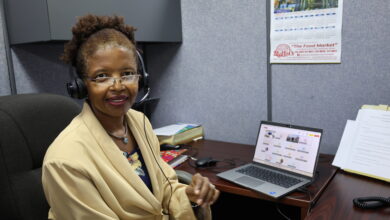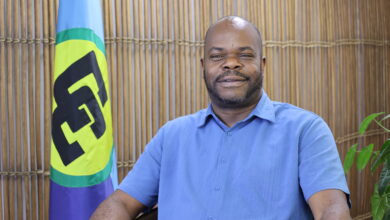ADDRESS BY SECRETARY GENERAL OF THE CARIBBEAN COMMUNITY, EDWIN W. CARRINGTON
Mr. Chairman
Other Distinguished Ministers
Other Distinguished Delegates
Secretariat Staff
Members of the Media
Good Morning. It gives me great pleasure to welcome you to the Secretariat and the Seventh Meeting of the Council for Trade and Economic Development. I expect that this will be our last meeting for this year 1999, indeed for this century, and it would be very fitting if we can make it a memorable one by taking the necessary decisions to lay the ground for the beginning of the next year and the new century.
The Agenda for this Meeting is wide-ranging, as are the responsibilities of COTED. On this occasion the matters for consideration relate to:
the CSME
external economic and trade relations
the functioning of the Common Market and intra-regional trade
regional standards and the establishment of effective institutional arrangements
agriculture
sustainable development and
services.
In the new institutional arrangements established by Protocol1, this Council has responsibility for promoting the development and overseeing the operation of the CARICOM Single Market and Economy. The Conference of the Heads of Government having agreed in 1989 to the concept of a CARICOM Single Market and Economy and in 1992 on how that Single Market and Economy should be established and committed itself in 1997 that 1999 would be the year when the key elements of the CSME would be in place. We have been making progress towards this objective. But there is still a lot of work to be done. I implore us all to redouble our efforts and be guided by the biblical injunction that it is not the beginning but the continuing of the same until it is thoroughly finished, which yieldeth the true glory! So let it be with the Single Market and Economy.
To refresh the public mind we must recall that the defining features of the CARICOM Single Market and Economy are the free movement of goods, services, capital and labour and a common external trade policy. The objective is the creation of a single enlarged economic space which maket it possible to move effectively shift the Region’s focus to competitive production for both intra-regional and extra-regional markets and the achievement of the Community’s primary goal of a viable economic ans social Community including improved standards of living and increased levels of competitiveness and production.
The revision of the Treaty of Chaguaramas is designed to provide the legal framework for the establishment of the CSME providing for, among other principles,
the Right of Establishment, the Provision of Services and the Movement of Capital;
Trade, Industrial, Agricultural, Transport and Competition Policy;
support for Disadvantaged Countries, Regions and Sectors; and
Disputes Settlement.
The COTED, in addition to the CSME, has particular responsibility for most of these and realted areas, namely matters relating to goods, services, trade (intra-and extra-regional), industry, agriculture, transport, competition and also science and technology and environment and sustainable development. All of these are integral elements of the CSME. As I had indicated earlier, we are well on the way to realising our 1999 goals. The Treaty provisions for the right of establishment, provision of services and movement of capital – in Protocol 11 – are in place and being provisionally applied (as if in force). The necessary groundwork is being undertaken to facilitate effective implementation of the Protocol. Five of the other seven Protocols revising the Treaty are awaiting the signatures of only two Member States which are committed to doing so as soon as their legal processes will allow. The remaining two Protocols on Competition Policy and Disputes Settlement are in draft and are on the Agenda of this Meeting of COTED for consideration.
Matters on this Meeting’s Agenda relate directly to the production and trade in goods and services. While restrictions on the intra-regional trade in goods are relatively few, not surprisingly Member States have been becoming more vigilant about protecting their rights in an increasingly liberalised environment. Resolution of such issues and the establishment of the policies and institutional arrangements relating to the functioning of the market, standards and fisheries development and the development of the services sectors in the Region are critical and urgent, especially as we seek to perform effectively in the wider global environment.
Two weeks ago COTED met in special session to consider external negotiation issues. External trade and economic matters are particularly important to our small economies and a significant part of today’s agenda touch on these issues.
The Rules of Procedure of COTED have given Antigua and Barbuda the responsibility for chairing this Seventh Meeting of COTED. I therefore now have the pleasure of calling on the Hon. Hilroy Humphreys, Minister of Commerce, Industry and Business Development of Antigua and Barbuda to guide our proceedings today.
*****
SPEECH BY THE HON. HILROY HUMPHREYS, MINISTER OF COMMERCE, INDUSTRY AND BUSINESS DEVELOPMENT, ANTIGUA AND BARBUDA, ON THE OCCASION OF THE SEVENTH MEETING OF THE COUNCIL FOR TRADE AND ECONOMIC DEVELOPMENT (COTED), 8 OCTOBER 1999, GEORGETOWN, GUYANA
Outgoing Chairman of the COTED
Other distinguished colleagues
Excellencies
Delegates
Ladies and gentlemen
Please permit me to commence my brief remarks by expressing appreciation on behalf of all delegates to the Government of Guyana and the CARICOM Secretariat for the warm and splendid arrangements offered our delegations. It is always a pleasure to visit Georgetown, even if it is only for 48 hours.
Colleagues, since we last met there have been many important events. Special mention must be made of ongoing Lome and Free Trade Area of the Americas (FTAA) negotiations, as well as the negotiations to complete the revision of the Treaty of Chaguaramas. In certain cases there has been some success, while in others, there is work still to be completed.
The Caribbean will be faced with some important challenges by the end of this millennium. The recent economic and political changes in the world have to some extent weakened the Region, reinforced by a disturbing environmental situation. Our States know too often the ravages of natural catastrophes, and a few – Barbados, Grenada, St. Vincent and the Grenadines, and we understand Guyana as well – are now faced with the phenomenon of “fish kill”. This poses serious danger to those countries’ fishing and tourism industries. The phenomenon could impact on other countries, since “we are all swimming in the same fish bowl”; a ripple in Barbados is also felt in Antigua and Barbuda. Such is the nature and reality of the CARICOM archipelago.
We have, as colleagues, a shared interest in regional integration for mutual prosperity and development. As small economies, integration and co-operation are the surest ways in which small economies like ours can face the challenges posed by the present global economic environment. It is therefore imperative to pool our resources and among other things, implement the measures of Protocol II to ensure the viability of our economies while securing markets for our products.
The Government of Antigua and Barbuda is supportive of CARICOM establishing a Free Trade Agreement with Cuba. Such an FTA would further provide for Cuba’s inclusion into our trading arrangements, thereby providing many opportunities for linkages in the production process and for strengthening CARICOM’s negotiating position, particularly with the European Union.
In an attempt to improve our productive capacity, colleagues, I urge you, as a priority area, to include the business of Services high on the agenda for the next COTED Meeting. CARICOM has a comparative advantage in this area, hence the importance of adopting strategies to maximise the benefits to the economies from the sector. Such discussions should start here and later involve other interest groups and partners within the Community.
Ministers, a packaged agenda is before us, and I look forward to your cooperation in making today’s meeting a success in the interest of the CARICOM Single Market and Economy.
I thank you.





